 Web Content Display
Web Content Display
 Web Content Display
Web Content Display
 Web Content Display
Web Content Display
The Department of Cell Biology
The Department of Cell Biology was formally established on April 1, 1979 at the Institute of Molecular Biology.
Even before that, since 1968, the subject "cell biology" had been taught as an optional course for 4th year biology students, and since 1972 as an obligatory subject, along with laboratory exercises. Since 1972, the Cell Biology Laboratory was also in operation. The head of the newly established Department was Prof. Włodzimierz Korohoda, Ph.D. (prof. since spring 1979), and the first employees of the Department were Barbara Kalisz-Nowak, M.D. (Ph.D. in 1977), Jolanta Cieślak, M.D. (Ph.D. in 1977; currently Dr. Jolanta Stanisz working in Canada), Marta Michalik, M.D. (Ph.D. in 1980), Jan Łabanowski, M.D. (Ph.D. in 1980; currently professor in the U.S.), Jan Kajstura, M.D. (Ph, D. in 1991; now a professor in the USA), and Jadwiga Pieguszewska, M.D. (now J. Golda) and Elzbieta Filo (now E. Sater).
Research topics included the properties and role of cell membranes in the regulation of cell movement, growth and differentiation, and in vitro animal cell culture methods.
In the 1980s, after Dr. J. Cieslak and Dr. J. Labanowski left Poland, the scope of research was extended to the analysis of the structure and function of the cytoskeleton and the relationship of energy metabolism to cell motility and differentiation activity. In the early 1980s, Krzysztof Reiss, M.D. (Ph.D. in 1988, Ph.D. in 1998; now a professor in the U.S.) Zbigniew Pietrzkowski, M.D. (Ph.D. in 1988; now in the U.S.) and Ewa Zaporowska, M.D., began their work, followed shortly thereafter by Beata Wójciak, M.D. (Ph.D. in 1991; now Dr. B. Wójciak-Stothard, in the U.K.).In the 1980s and 1990s, collaboration with research centers in Germany, the U.K. and the U.S. continued. Professor Korohoda stayed as a visiting professor in Germany three times, Dr. Jan Kajstura as a fellow of the A. von Humboldt Foundation in Germany (with Prof. J. Bereiter-Hahn), K. Reiss and Z. Pietrzkowski had several years of internships in the USA (with Prof. R. Baserga), and Dr. B. Wójciak in Scotland (with Prof. A. Curtis). The department was visited by prominent scholars, such as K. E. Wohlfarth-Bottermann, A. Giese, A. Curtis, J. Bereiter-Hahn, L. Wolpert, P. Knauff, A. Lev and others, among others. During this period, research was focused on issues related to the regulation of growth and differentiation of animal cells in in vitro cultures.
In the years: 2006-2022, the Department employed seven independent researchers: retired Prof. Włodzimierz Korohoda, PhD, D.Sc.; Prof. Zbigniew Madeja, PhD, D.Sc.; Prof. Jarosław Czyż, PhD, D.Sc.; Prof. Justyna Drukała, PhD, D.Sc.; Marta Michalik, PhD, D.Sc.; Prof. UJ; Jolanta Sroka, PhD, D.Sc.; Prof. UJ; and Prof. Ewa Zuba-Surma, PhD, D.Sc.. Assistant professors and assistants included: Dr. Eliza Łączna (Zimoląg), Dr. Monika Rak, Dr. Sylwia Bobis-Wozowicz, Dr. Damian Ryszawy, Dr. Katarzyna Piwowarczyk (Szpak), Dr. Elżbieta Karnas (Kamycka), Dr. Małgorzata Sekuła-Stryjewska, Dr. Paweł Ferdek, Dr. Slawomir Lasota, Dr. Milena Paw (Kosińska), Dr. Dawid Wnuk.
The positions of independent biologists also included: Dr. Julia Borowczyk, Dr. Sylwia Bobis-Wozowicz, Dr. Damian Ryszawy, Dr. Katarzyna Piwowarczyk, Dr. Anna Łabędź-Masłowska, Dr. Katarzyna Kmiotek-Wasylewska, Dr. Dawid Wnuk, Dr. Marcin Piejko, Maciej Pudełek, M.Sc. Joanna Stalińska, M.Sc. Alicja Ślusarczyk, M.Sc.
Scientific and technical staff positions included: Lidia Ciastoń, M.Sc., Jadwiga Golda, M.Sc., Elzbieta Sater, M.Sc., and Maria Starostka-Wróbel, M.Sc. Administrative positions in the Department were held by Katarzyna Wolan, MA, and Anna Przybyszewska, MA.
The history of doctorates that were created in the Department of Cell Biology can be traced by clicking on the link: DOCTORATES
 Web Content Display
Web Content Display
CALENDAR OF ZBK
On November 23, 2023, the Interdisciplinary Project Team of BioMiStem, under the direction of Prof. Ewa Zuba-Surma, was awarded in the XXI edition of the Economic Award of the President of the Republic of Poland for the newly developed "cell therapy" named MesoCellA-Ortho. Professor Ewa Zuba-Surma became a member of the Stem Cell and Cell Therapy Team of the Polish Academy of Sciences. The team was established at the V Faculty of Medical Sciences of the Polish Academy of Sciences.
In the framework of the competition for Individual Research Grants, funding was awarded to the project of Dr. Dawid Wnuk entitled "Mechanisms of butein influence on cellular processes during bronchial remodeling in asthma." The project will be conducted in international cooperation with the Department of Pulmonology at Maastricht University. Dr. Dawid Wnuk, as an active member of the Polish Biochemical Society, has been appointed as the Polish delegate of PTBioch to the international structures of FEBS (Federation of European Biochemical Societies) Junior. His task is to create the national structures of FEBS Junior Poland.
A team led by our former employee Dr. Marcin Piejko has developed a new method for regenerating soft tissue in areas of tissue loss. The developed method is based on processing adipose tissue from any donor, and then transplanting the obtained preparation to the tissue deficit area. This preparation - called adipoECM by its creators - is treated by the body as scaffolding, which is populated by the patient's own cells, including blood vessels. The Faculty Committee for the Research Support Module competition for funding research of PhD students and participants of doctoral studies at WBBiB, organized as part of the strategic program Excellence Initiative at the Jagiellonian University, announced the results of the just concluded competition. Among the winners were two PhD students from our Department: MSc Maciej Pudełek. Title of the project: Characterization of the mechanisms of doxorubicin-induced microevolution in glioblastoma cells. MSc Jacek Litewka. Title of the project: Therapeutic strategies in chronic pancreatitis.
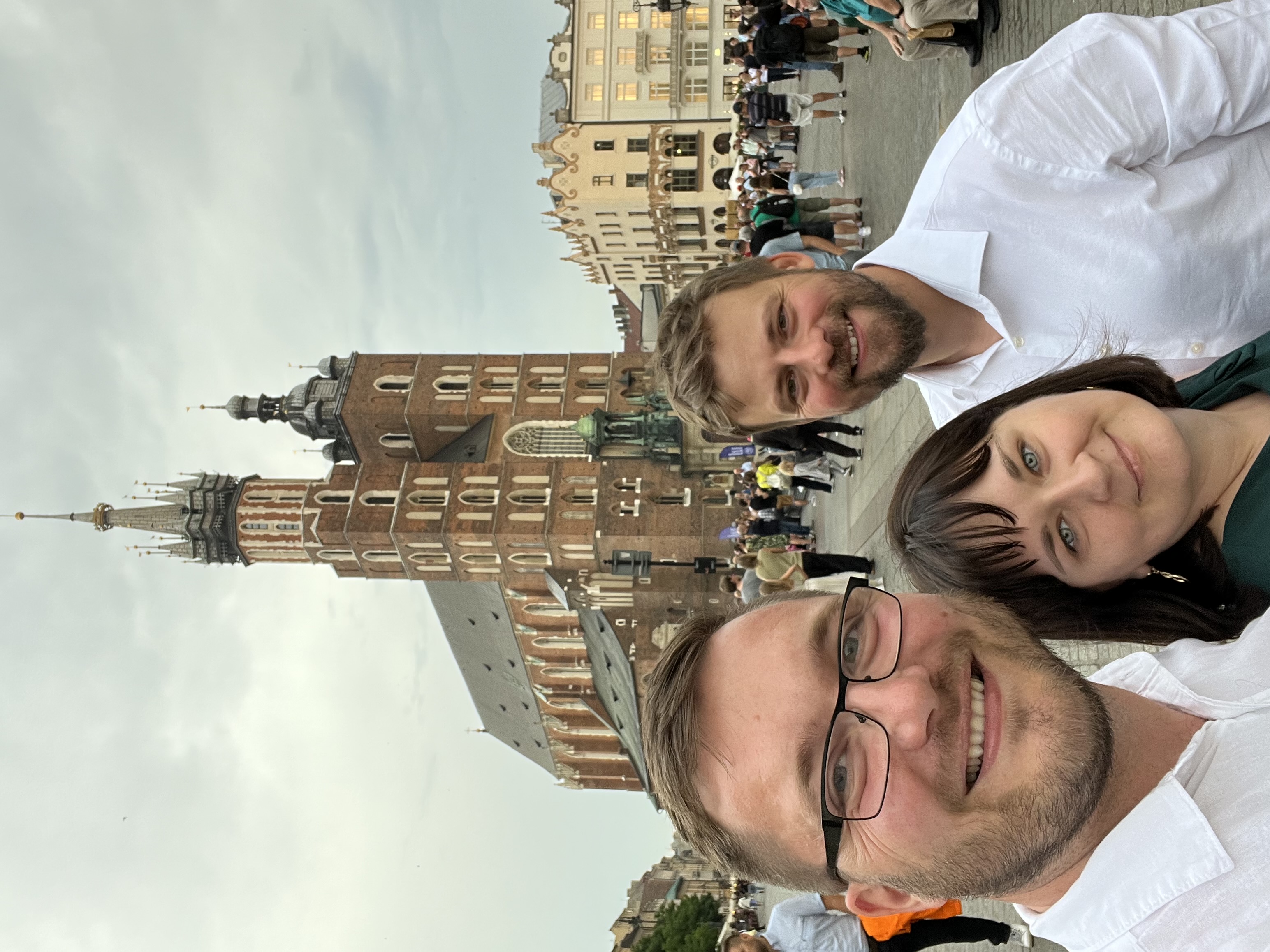
On the occasion of the Polish premiere (14.06.2023) of the book titled "The Code Breaker: Jennifer Doudna, Gene Editing, and the Future of the Human Race" by Walter Isaacson, on 23.06.2023, at the Institute of Cell Biology, we hosted one of the heroes of the book - Dr. Krzysztof Chyliński - a co-creator of the CRISPR-Cas gene editing technology. During Dr. Chyliński's stay at the ICB UJ, an open lecture was also held.
Dr. Milena Paw and Dr. Dawid Wnuk were invited by the Insignis publishing house to provide scientific consultation for the translation of the book "The Code Breaker: Jennifer Doudna, Gene Editing, and the Future of the Human Race" by Walter Isaacson - a distinguished biographer of worldwide fame, author of bestsellers such as Steve Jobs and Leonardo da Vinci.
On 24.05.2023, Professor Ewa Zuba-Surma received a prestigious scholarship from the Kosciuszko Foundation, and as part of it, she will undertake an internship at the State University in New Haven, where she will conduct research on the pro-regenerative role of extracellular vesicles (EVs) secreted by stem cells. She received the scholarship at the US Embassy in Warsaw from the hands of the US Ambassador to Poland.
MesoCellA-Ortho - a biological medicinal product for advanced therapy, whose active substance consists of human autologous adipose tissue-derived mesenchymal stem/stromal cells (AT-MSCs) created as part of the BioMiStem project led by Prof. Ewa Zuba-Surma in cooperation with Galen Ortopedia Sp. z o.o. company, has received a prestigious award and title: "Polish Product of the Future".
Dr. Milena Paw and Dr. Dawid Wnuk co-authored a special issue of Biomecidices titled "Fibroblasts: Observations from a molecular and pathophysiological perspective".
Dr. Paweł Ferdek received funding from the National Science Centre in the SONATABIS12 competition in the amount of 3,670,394 PLN for research covered by the project entitled "A New Perspective on Pancreatic Diseases - Ionic Signaling, Mitochondria, and TRPA1 Channel". His project ranked 4th on the list of 16 awarded projects in Poland, out of 125 applications submitted in the competition.
On January 12, 2023, by the decision of the Vice-President of the Polish Academy of Sciences, Dr. Hab. Mirosława Ostrowska, the Head of ZBK, Prof. Zbigniew Madeja, was appointed as a Member of the Scientific Council of the M. Nencki Institute of Experimental Biology of the Polish Academy of Sciences for the term 2023-2026.
In 2023, 3 people defended their doctoral dissertations at ZBK: Sylwia Noga, Jessica Catapano, Tomasz Wróbel.
Dr Elżbieta Karnas was honored by the Polish Society of Cell Biology for the publication: Extracellular vesicles from human iPSCs enhance reconstitution capacity of cord blood-derived hematopoietic stem and progenitor cells., in which she is the first author, and received funding for the MINIATURA5 project: Genetic engineering methods as a tool in research on the molecular mechanism of the effect of extracellular vesicles from iPS cells on cord blood hematopoietic cells, during which she undertook a three-month scientific internship in Hanover.
Prof. Ewa Zuba-Surma co-organized two scientific sessions during the international conference Tissue Engineering and Regenerative Medicine International Society (TERMIS) - European Chapter 2022 held in Krakow.
By decision of the Commission for POB BioS affairs, Dr. Sławomir Lasota received an individual research grant for the project: Migration and electrotactic potential of pancreatic solid tumor fibroblasts. In the contest for funding for doctoral students and participants of doctoral studies at the WBBiB announced as part of the strategic program "Excellence Initiative" at the Jagiellonian University, there was also a project by MSc Agnieszka Kusiak entitled The role of mitochondrial fragmentation in stellate cell progression and resistance to chemotherapy in pancreatic ductal adenocarcinoma.
In 2022, 2 people defended their PhD at ZBK: Agnieszka Szkaradek and Dawid Wnuk.
In 2021, the President of the Republic of Poland awarded Dr. habil. Justyna Druka with the title of professor of medical sciences and health sciences.
Dr. Sylwia Bobis-Wozowicz received funding for her project TANGO IV, NCBiR Innovative drug for the treatment of organ fibrosis.
In 2021, Katarzyna Kmiotek-Wasylewska defended her doctorate at ZBK.
With deep sadness and disbelief, we bid farewell to our colleague, and for many a friend and colleague, Dr. habil. Jolanta Sroka, prof. UJ, who passed away suddenly in January 2021.
In 2020, the President of the Republic of Poland awarded the title of professor to Dr. hab. Ewa Zub-Surma. On February 18, the National Science Centre announced the results of the MAESTRO 11 competition. In the life sciences panel, a grant of 4,494,000 PLN was awarded to the project of Dr. hab. Ewa Zub-Surma entitled: Molecular and cellular mechanisms of pro-regenerative action of extracellular vesicles (EVs) from stem cells in ischemic heart damage: The role of microRNAs. Dr. Paweł Ferdek also received funding of nearly 2 million PLN for his research project: What causes activated stellate cells to fibrotize the pancreas?
On November 25, 2020, the Senate of the Jagiellonian University appointed Prof. Zbigniew Madeja as a member of the University Council for the term 2021–2024. Professor Zbigniew Madeja was also elected as a specialist member of the Committee for Molecular Biology of the Cell of the Polish Academy of Sciences. This is Professor Madeja's second term in the CBMC of the PAN, having previously served from 2016 to 2019.
Under the scientific supervision of Dr. Damian Ryszawy, Michał Rąpała received a grant of 220,000 PLN for the implementation of the project: Synergistic action of new manganese porphyrins with sodium ascorbate as a system for targeted anti-cancer therapies awarded in the DIAMOND GRANT 9 competition. In 2020, Marcin Luty successfully defended his doctoral thesis at ZBK.
Z głębokim żalem i niedowierzaniem pożegnalismy naszego współpracownika, a dla wielu przyjaciela i kolegę dra Damiana Ryszawego, który odszedł nagle w dn. 11.09.2020 roku.
In the autumn of 2010, after several years of effort by Dr. Justyna Drukała, the Cell and Tissue Engineering Laboratory was opened at the Institute. The laboratory obtained accreditation. Below are a few photographs from the ceremonial opening of the Laboratory:
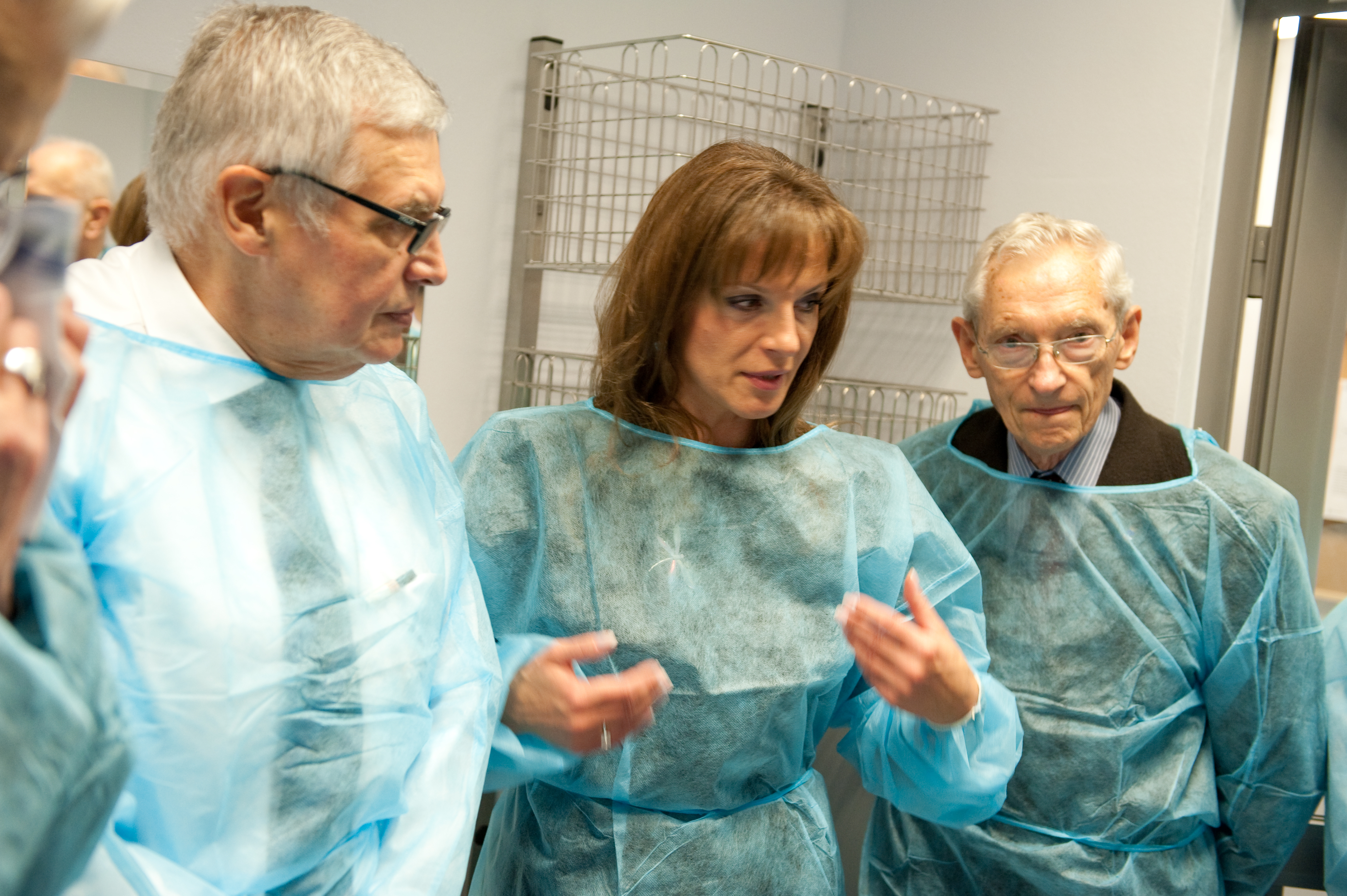




In 2010, the President of the Republic of Poland also awarded the title of professor to Dr. hab. Zbigniew Madeja.
In 2011, Dr. hab. Jarosław Czyż received funding for a project in the NCN OPUS1 competition. 361,000 PLN was allocated for research on the analysis of interactions between prostate cancer cells and the immune system and endothelium within the "metastatic niche".
In 2012, Dr. Marta Michalik was awarded the Golden Medal for Long Service by the President of the Republic of Poland, while Prof. Dr. hab. Zbigniew Madeja received over 435,000 PLN in funding for the implementation of the NCN OPUS4 project entitled: Dynamics and localization of GTPase activation site from the Rho family of proteins during electrotaxis of cells moving according to different migration strategies.
In 2013, Dr. hab. Ewa Zuba-Surma received funding in the NCN SONATA BIS3 project. An amount of almost 1.5 million PLN was allocated for research in the project: Studies on the effectiveness of microfragments from genetically modified stem cells as carriers of miRNA with proangiogenic and cardiomyogenic activity. Mgr Katarzyna Piwowarczyk received funding in the PRELUDIUM5 competition for the project: Interference of fenofibrate with the "metastatic niche" properties of lung cancer cells.

On July 24, 2014, the Head of the Department, Professor Zbigniew Madeja, was appointed the Dean of the Faculty of Biochemistry, Biophysics, and Biotechnology at the Jagiellonian University. For the first time, while serving in this role, he chaired the Faculty Council on September 23, 2014. He held this position until 2020. In 2014, the position of Vice-Dean for Teaching Affairs was also taken over by Dr. Marta Michalik, a professor from our Department, who continues to hold this position to this day. In 2014, three people defended their doctorates in the Department of Cell Biology: Ewa Niedziałkowska, Monika Rak, and Katarzyna Piwowarczyk (Szpak).
In 2015, the President of the Republic of Poland awarded the title of professor to Dr. hab. Jarosław Czyż, and Dr. hab. Ewa Zuba-Surma received funding for her project entitled: Optimization of complex biocompatible scaffolds based on graphene and defined populations of stem cells for tissue regeneration purposes in the NCN SYMFONIA 3 competition, in the amount of almost 5 million Polish złoty! Dr. Damian Ryszawy received nearly 700,000 zł for the implementation of the project entitled The role of Snail-1 and Cx43 proteins in regulating the invasiveness of human glioblastoma cells in the SONATA10 NCN competition. In 2015, three people defended their doctorates in the Department of Cell Biology: Damian Ryszawy, Katarzyna Wójcik-Pszczoła (Faculty of Medicine at the Jagiellonian University), Paulina Koczurkiewicz-Adamczyk (Faculty of Pharmacy at the Jagiellonian University).
In 2016, Dr. Marta Michalik and Dr. Jarosław Czyż received funding in the OPUS9 project. Dr. Marta Michalik received 952,000 zł for research: Phenotypic transitions of bronchial fibroblasts into myofibroblasts - the role of differentiated activation of the TGF-beta/Smad pathway in cells from asthmatics and non-asthmatics - in vitro research in the 2D, 3D, and EMTU model, while Prof. Dr. Jarosław Czyż received almost 750,000 zł for research: The influence of fenofibrate on the invasive potential of prostate cancer cells modulated by chemotherapeutics. Dr. Sylwia Bobis-Wozowicz received funding of almost 1 million zł in the NCN SONATA12 competition entitled The influence of hypoxia on molecular characteristics and biological potential, including the ability to regenerate heart tissue, extracellular vesicles secreted by human induced pluripotent stem cells. Mgr Anna Masłowska-Łabędź received funding in the NCN ETIUDA 4 competition for the project: Assessment of the biological potential of microparticles from antigen-specific bone marrow-derived stem cells for tissue regeneration purposes. In 2016, two people defended their doctorates in the Department of Cell Biology: Julia Borowczyk-Michałowska and Eliza Zimoląg (Łączna).
In 2017, Dr. Justyna Drukała received the Golden Otis award for her research in tissue engineering, while the BioMiStem Consortium, composed of the Jagiellonian University (leader), AGH University of Science and Technology in Krakow, Institute of Electronic Materials Technology in Warsaw, Medical University of Lublin, Institute of Pharmacology of the Polish Academy of Sciences in Krakow, Institute of Zootechnics - State Research Institute in Krakow, and Institute of Innovative Medicine Ltd. in Krakow, under the direct supervision of Dr. Ewa Zuba-Surma, received funding in the STRATEGMED, NCBR competition. The project entitled Development of optimized methods for the treatment of tissue damage based on innovative composites and mesenchymal stem cells and their derivatives in patients with civilization diseases received almost 17 million zł for research! In 2017, three people defended their doctorates in the Department of Cell Biology: Milena Paw (Kosińska), Sławomir Lasota, and Maciej Grys.
In 2018, employees of the Department of Cell Biology and the Department of Physical Biochemistry, led by Prof. Marta Dziedzicka-Wasylewska and Prof. Zbigniew Madeja, organized the XLV. Winter School titled Signaling - from molecules to cells and back from February 9-14 in Zakopane. Furthermore, Professor Zbigniew Madeja received over a million złoty in the OPUS16 competition for research: Biphasic mechanism of electrotactic reaction in mouse 3T3 fibroblasts: complementary role of ion channels and chemoattractant receptors. Dr. Paweł Ferdek joined the team and began the implementation of his research project: Alcoholic pancreas fibrosis - the role of stellate cells, intracellular calcium signaling, and Bcl-2 family proteins. He received funding of almost 800,000 zł in the FNP HOMING 4/2017 project for this purpose. Mgr Katarzyna Kmiotek-Wasylewska received funding from NCN for her project ETIUDA6 entitled Procardiomyogenic and proangiogenic properties of cellular microvesicles derived from human induced pluripotent stem cells overexpressing selected microRNAs. In 2018, Marta Adamiak defended her doctorate in the Department of Cell Biology.
In 2019, Dr. Justyna Drukała was named the Human of the Year 2018 - awarded by Dziennik Polski and Gazeta Krakowska for "humanism and empathy and passion in scientific work, for transplanting millions of cultured skin cells to a patient who had 95 percent of his body surface burned".
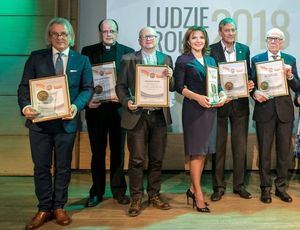
AI Chat
AI Image Generator
AI Video
Login
AI Chat
AI Chat is an AI chatbot that writes text. You can use it to write stories, messages, or programming code. You can use the AI chatbot as a virtual tutor in almost any subject.
Chat History
Translate into english:
Mgr Dawid Wnuk ze srodków NCN otrzymał finansowanie swojego projektu ETIUDA7 pt. Określenie roli szlaku TGFβ1/Smad w procesie fenotypowego przejścia fibroblastów oskrzelowych w miofibroblasty w astmie. Dr Milena Paw otrzymała finansowanie projektu MINIATURA3 NCN: Rola deacetylaz histonowych w epigenetycznej regulacji indukowanych przez TGF-β1 przejść fenotypowych ludzkich fibroblastów oskrzelowych w miofibroblasty w astmie. Maciej Pudełek pod opieką naukową dra Damiana Ryszawego otrzymał finansowanie w wys. 220 tys. zł na realizacje projektu: Rola mechanizmów warunkujących lekooporność w kształtowaniu potencjału inwazyjnego komórek ludzkiego glejaka wielopostaciowego przyznanego w konkursie DIAMENTOWY GRANT 8. W roku 2019 doktorat w ZBK obroniły dwie osoby: Anna Łabędź-Masłowska oraz Elżbieta Karnas (Kamycka).
Delete
Mgr Dawid Wnuk received funding for his project ETIUDA7 titled "Determining the role of the TGFβ1/Smad pathway in the phenotypic transition of bronchial fibroblasts into myofibroblasts in asthma" from the NCN funds. Dr Milena Paw received funding for her project MINIATURA3 NCN: "The role of histone deacetylases in the epigenetic regulation of TGF-β1-induced phenotypic transitions of human bronchial fibroblasts into myofibroblasts in asthma." Maciej Pudełek, under the scientific supervision of Dr Damian Ryszawy, received funding of 220,000 PLN for the implementation of the project: "The role of mechanisms conditioning drug resistance in shaping the invasive potential of human glioblastoma cells" awarded in the DIAMOND GRANT 8 competition. In 2019, two people defended their doctoral dissertations at ZBK: Anna Łabędź-Masłowska and Elżbieta Karnas (Kamycka).
Since October 2006, the Department has been managed by Professor Zbigniew Madeja.
In 2007, the employees of the Department, led by Dr. Justyna Drukała and Professor Zbigniew Madeja, organized the XXXIV Winter School titled "Cell and its Environment" in Zakopane from 7-11 March 2007. The School was organized on the occasion of the 70th birthday of Professor Włodzimierz Korohoda. Also in 2007, by decision of the President of the Republic of Poland dated 9 October 2007, Dr. Justyna Drukała was awarded the Bronze Cross of Merit.
In the years 1994-98, Poland saw the departure of Dr. hab. Jan Kajstura, Dr. hab. K. Reiss, Dr. B. Wójciak, Dr. Z. Pietrzkowski. They all continued their scientific careers, with most holding independent, managerial positions in the USA and the UK. In their place, the Department hired Dr. Zbigniew Madeja (currently Prof. Dr. Hab.), MSc Justyna Drukała (currently Prof. Dr. Hab.), MSc Jolanta Sroka (d. 2021), MSc Małgorzata Pierzchalska (currently Dr. Hab. Prof. at the University of Agriculture in Krakow), MSc Jarosław Czyż (currently Prof. Dr. Hab.). Several doctoral students also began their studies, and after obtaining their doctorates, they went on to work in other scientific institutes (including Dr. Ewa Stępień, Dr. Anna Jurkiewicz, Dr. Maria Mycielska, Dr. Laura Bandura). The new scientific employees of the Department completed internships in the USA, UK, Germany, France, Switzerland, and Sweden, and many graduates of the Department work scientifically outside of Poland (Prof. Dr. Hab. Magdalena Chrzanowska-Wodnicka, Prof. Dr. Magdalena Kucia, Dr. Agnieszka Patkaniowska).
In the 1990s, in addition to conducting basic research, there was interest in applying research findings to medical practice. Collaboration was established with Dr. Kazimierz Cieślik, Head of the Burns and Plastic Surgery Department at the Rydygier Hospital in Krakow. Keratinocytes cultured in the Department were used to treat non-healing trophic ulcers and burns. A Laboratory of Cell and Tissue Engineering was established at the hospital, with Dr. Justyna Drukała as its head.
In addition to skin cell research (keratinocytes, fibroblasts, and melanocytes), cell cultures were used to treat patient wounds. In the following years, the collaboration expanded to the treatment of burns in children (collaboration with Prof. Dr. Hab. Jacek Puchała) and oral cavity wounds (collaboration with Prof. Dr. Hab. Jan Zapała) as well as varicose veins (Assoc. Prof. Dr. Hab. Rafał Niżankowski).
In the second half of the 1990s, alongside the ongoing research, the interactions between cancer cells and normal cells in the processes of metastasis formation, growth regulation, and differentiation of stem cells were analyzed. The effects of organometallic compounds on cells were also studied, and in the last three years, research on the use of electrochemistry in cell biology was initiated on a larger scale, collaborating with students and doctoral students. This wide range of research based on the use of in vitro cultured human and animal cells is associated with the mastery of cytometry and computer-assisted photometry methods by the Department's employees, as well as immunocytochemical and electrochemical methods. Collaboration is ongoing with numerous foreign research centers, some of which are led by former Department employees, as well as with other scientific institutes in Poland.
 MSc Krzysztof Reiss (PhD in 1988, habilitation in 1998; currently a professor in the USA), MSc Zbigniew Pietrzkowski (PhD in 1988; currently in the USA) and Dr. Ewa Zaporowska, and soon afterwards by MSc Beata Wójciak (PhD in 1991; currently Dr. B. Wójciak-Stothard in the United Kingdom). In the 1980s and 1990s, cooperation continued with scientific centers in Germany, the United Kingdom, and the USA. Professor Korohoda visited Germany three times as a visiting professor, Dr. Jan Kajstura as a fellow of the A. von Humboldt Foundation in Germany (under Prof. J. Bereiter-Hahna), K. Reiss and Z. Pietrzkowski underwent several-year internships in the USA (under Prof. R. Basergi), and Dr. B. Wójciak in Scotland (under Prof. A. Curtis). The department was visited by eminent scholars, including K.E. Wohlfarth-Bottermann, A. Giese, A. Curtis, J. Bereiter-Hahna, L. Wolpert, P. Knauff, A. Leva, and others. During this period, the research focused on issues related to the regulation of growth and differentiation of animal cells in in vitro cultures.
MSc Krzysztof Reiss (PhD in 1988, habilitation in 1998; currently a professor in the USA), MSc Zbigniew Pietrzkowski (PhD in 1988; currently in the USA) and Dr. Ewa Zaporowska, and soon afterwards by MSc Beata Wójciak (PhD in 1991; currently Dr. B. Wójciak-Stothard in the United Kingdom). In the 1980s and 1990s, cooperation continued with scientific centers in Germany, the United Kingdom, and the USA. Professor Korohoda visited Germany three times as a visiting professor, Dr. Jan Kajstura as a fellow of the A. von Humboldt Foundation in Germany (under Prof. J. Bereiter-Hahna), K. Reiss and Z. Pietrzkowski underwent several-year internships in the USA (under Prof. R. Basergi), and Dr. B. Wójciak in Scotland (under Prof. A. Curtis). The department was visited by eminent scholars, including K.E. Wohlfarth-Bottermann, A. Giese, A. Curtis, J. Bereiter-Hahna, L. Wolpert, P. Knauff, A. Leva, and others. During this period, the research focused on issues related to the regulation of growth and differentiation of animal cells in in vitro cultures.
 Web Content Display
Web Content Display
Renewal of the doctorate of Professor Włodzimierz Korohoda
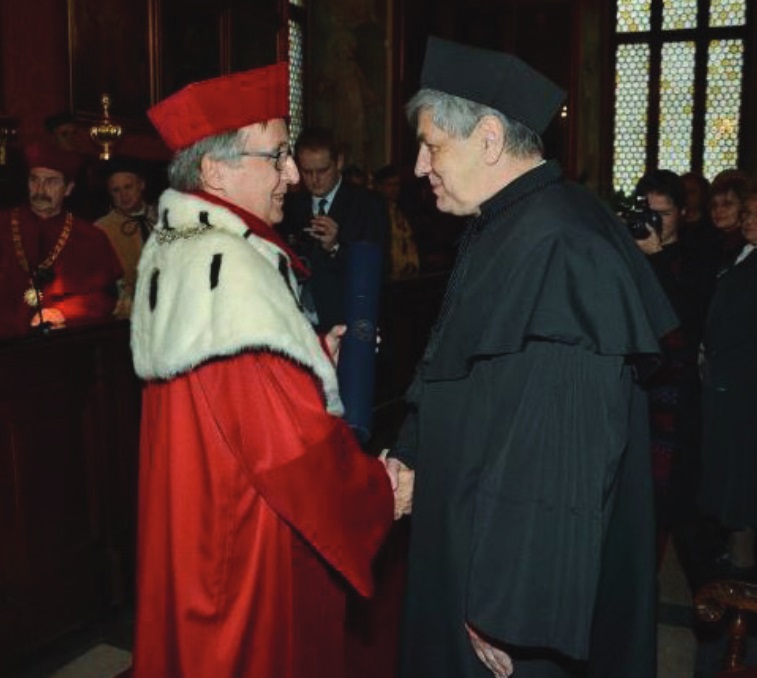 On December 5, 2013, during a special meeting of the Jagiellonian University Senate, a ceremony took place to renew the doctorate of Professor Włodzimierz Korohoda after 50 years. On this occasion, the laudation was delivered by Professor Zbigniew Madeja, PhD - Professor Korohoda's student and his successor as head of the Department of Cell Biology:
On December 5, 2013, during a special meeting of the Jagiellonian University Senate, a ceremony took place to renew the doctorate of Professor Włodzimierz Korohoda after 50 years. On this occasion, the laudation was delivered by Professor Zbigniew Madeja, PhD - Professor Korohoda's student and his successor as head of the Department of Cell Biology:Professor Włodzimierz Korohoda was born in 1937, and in fact from the very beginning, in the home of his parents Maria and Jerzy Korohoda, he had the opportunity to meet many outstanding professors. Suffice it to mention that Professor Witold Wilkosz gave little Włodek his first numeracy lessons, and Professor Tadeusz Banachiewicz showed him his observatory and urged him to go study astronomy. It's no wonder that, as Professor Korohoda himself recalls, "it was almost always clear that I would someday engage in scientific activities, even if I didn't apply myself very much to science at school." The fact that he eventually became a biologist was decided in 1953, when, together with his graduating class from the Nowodworski High School in Cracow, he visited the laboratory of the Department of Plant Physiology at the Jagiellonian University, where he saw his later supervisor, Professor Jan Zurzycki, at work, as well as Professor Andrzej Bajer, who at that time recorded the division of a living cell and the movements of chromosomes on film under a microscope for the first time in the world. This decided him to choose biology. After two years of study, he was nostalgic about changing his interests to the sciences, but luckily the charm of the laboratory where Professor Zurzycki worked, which belonged to the department headed by the excellent scientist Professor Franciszek Górski, prevailed. Fortunately for cell biology, Professor Korohoda was also not distracted from science by sports. For it is worth mentioning here that he was a competitive swimmer until 1954, but still in 1955 in Wroclaw, at the Polish University Championships, he won the championship title.
From his studies, which began in 1954, through his doctorate, habilitation and professorship, Professor Korohoda was and is permanently associated with Jagiellonian University. Here, in 1957, he defended his master's thesis and then took a job in the Department of Plant Physiology. He defended his doctoral thesis on the study of electrochemical properties of the cell surface during the differentiation process, a subject that remains relevant today, in 1963. He was the first doctoral student of Professor (then associate professor) Jan Zurzycki.
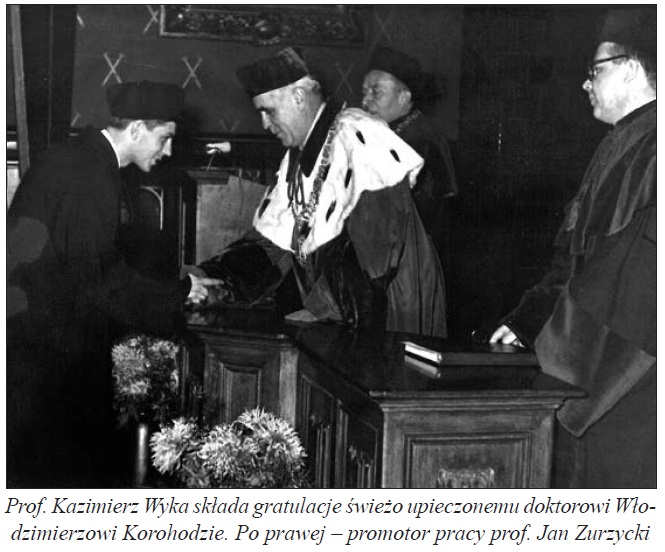
In 1965, he received a fellowship from The British Council of The Chester Beatty Royal Institute of Cancer Research in London. This gave him a unique opportunity to work with outstanding scientists who were forging the foundations of modern cell biology. Under the guidance of Professor Ambrose, he then published numerous papers, including in such renowned journals as Nature. During this period, he also has the unusual opportunity of direct contact with such scholars as Professors Abercrombie, Gingell, Wolpert, Hodgkin, Bangham and Curtis.
After returning to Krakow, he took up the study of the mechanisms of cell movement and the phenomena of transport across the cell membrane, and after his habilitation in 1971, the study of the function of the cytoskeleton. He also developed these research topics as a fellow of the Alexander von Humboldt Foundation, when he worked in Bonn at the Institute of Cytology under Professor Wohlfarth-Bottermann with Professor Stock.
Professor Korohoda devoted his entire professional life to the study of animal and human cells, especially the role of cell membranes in the regulation of cell movement, growth and differentiation, the study of regenerative processes and the mechanisms of tissue and cancer cell pathogenesis. The time allotted for this laudation makes it necessary to omit many aspects of Prof. Korohoda's rich scientific, teaching and organizational career, but it is impossible not to mention here several important strands of the Professor's activity. Prof. Korohoda was the organizer and later, from 1979 to 2005, the head of the Department of Cell Biology, as well as the supervisor in 21 completed doctoral dissertations. He supervised more than a hundred master's theses. More than a dozen of his students received their Ph.D. degrees and the title of professor. Professor Korohoda's achievements are evidenced by more than 150 original scientific articles and review papers published in international scientific journals and co-authorship of eight academic textbooks.
Parallel to his scientific work, he held a number of positions. He headed the Institute of Molecular Biology of the Faculty of Biology and Earth Sciences of the Jagiellonian University, during the difficult years of martial law and just after, and the Scientific Council of the Institute, in 1984-1988. He was a member of the Scientific Councils of the M. Nencki Institute of Experimental Biology of the Polish Academy of Sciences, the Institute of Biochemistry and Biophysics of the Polish Academy of Sciences, the Institute of Plant Physiology of the Polish Academy of Sciences and the Institute of Nuclear Physics, a member of the Committee of Cytobiology, and its chairman in 1992-1995. He was also a member of the Committee on Human Pathology and Molecular Genetics.
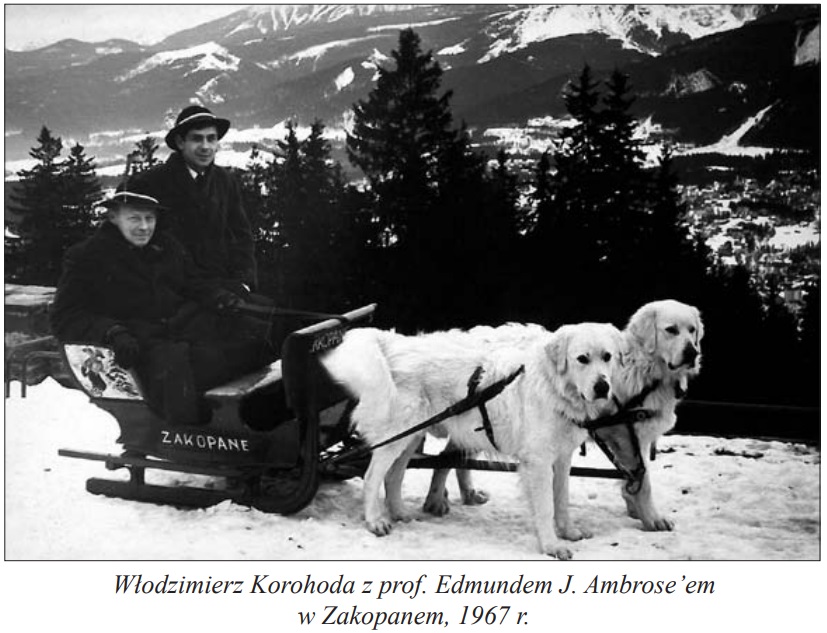 During his 55 years of scientific work, Professor Korohoda was repeatedly recognized with various awards. It is impossible to list all the decorations and awards here. However, it is perhaps worth mentioning that since 1991 Professor Korohoda has been a member of the Polish Academy of Arts and Sciences. Since 2007, he has been honorary chairman of the Cytobiology Committee, and since 2011 he has been an honorary member of the Polish Society of Cell Biology, of which he was one of the founders.
During his 55 years of scientific work, Professor Korohoda was repeatedly recognized with various awards. It is impossible to list all the decorations and awards here. However, it is perhaps worth mentioning that since 1991 Professor Korohoda has been a member of the Polish Academy of Arts and Sciences. Since 2007, he has been honorary chairman of the Cytobiology Committee, and since 2011 he has been an honorary member of the Polish Society of Cell Biology, of which he was one of the founders.
The Professor's efforts to integrate the scientific community cannot be overlooked. Among other things, he initiated cooperation with the medical community, which resulted in the development of new methods of cell culture for therapeutic purposes. This is one of the, still unfortunately few, examples of successful application of in vitro multiplied stem and progenitor cells in medical practice.
However, these dry data that I have taken the liberty of presenting here do not tell us what is most important. They do not tell us about the Professor's great scientific passion, which has always been and is for him cell biology. I have had the honor and pleasure of working with the Professor for well over 20 years now, and I can't recall a single conversation with him that didn't end sooner or later (and usually rather sooner) with a discussion of the latest results of his experimental work or plans for upcoming experiments. Always in these conversations, the Professor tried to encourage his interlocutors to think for themselves, repeating that in science, however painful it may be, one must sometimes also think. Without a doubt, conducting scientific research is not only a way of life for Professor Korohoda, but also great fun. It is impossible to see any sign of fatigue, routine or discouragement in him - at least as long as he remains at the laboratory table.
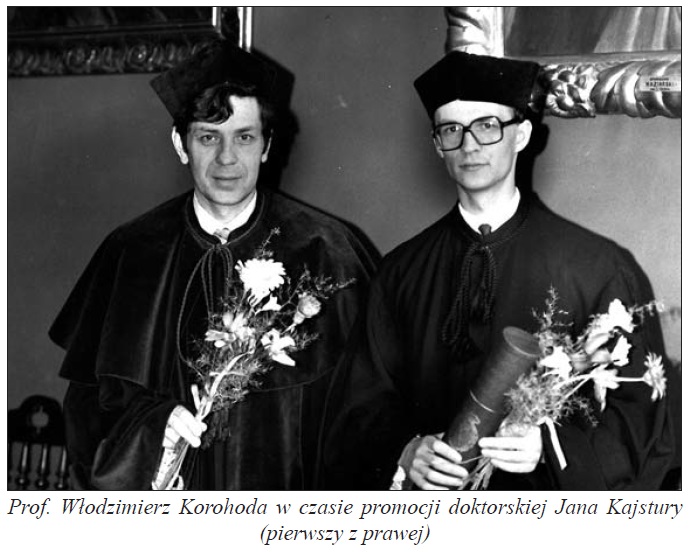
Probably it was this enthusiasm of the Professor that caused whole hosts of students to flock under his wing, many of whom are successfully developing their scientific careers at home and abroad at universities of such renown as Harvard University, to limit myself here to just one example of Professor Jan Kajstura.
Undoubtedly, Professor Korohoda's success in training his numerous students is also due to the fact that he has always tried to implement the principle of one of his masters, whom I have not yet mentioned here - Arthur Giese, professor at Princeton and Stanford University, the father of modern photobiology and author of excellent textbooks known also from Polish translations. Professor Korohoda often recalled how, in the 1970s, Professor Giese presented him with his principle by which 29 of Professor Gise's students became professors at universities in the United States, and more than 50 received doctoral degrees. He said at the time that "the task of an academic professor is not so much to teach, but to show young people what is worth doing, to choose the best of them, and to disturb them as little as possible." Without a doubt, Prof. Korohoda has masterfully put this principle into practice.
In conclusion, I would like to offer my sincere congratulations and hope that for many more years to come we will be able to cooperate in the conduct of scientific research and benefit from the invaluable advice of the Professor.
